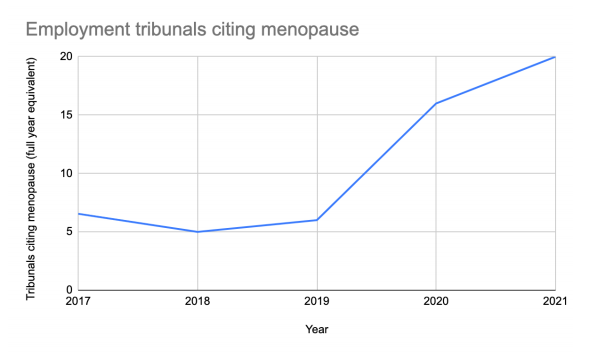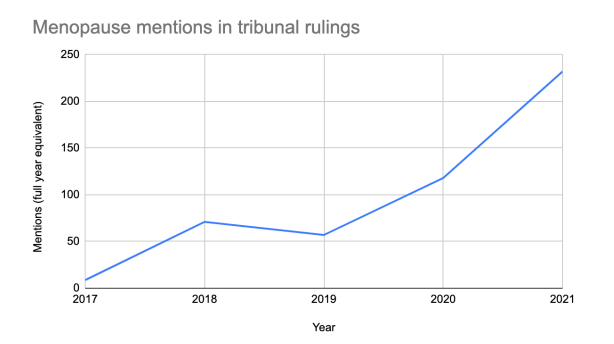Menopause in the workplace has a four-fold increase in mentions at employment tribunals this year. Over 116 employment tribunal cases include menopause in the first six months of 2021. If this continues to rise at the same pace, it’s estimated there will be 232 mentions of menopause in employment tribunals by the end of the year.
All this means that you need to know your rights when it comes to menopause and the workplace. Plus, employers need to understand what they can do to support women who are going through this period in their life.
Menopause and perimenopause
Let’s understand what menopause is and how it can impact women at work. Technically, menopause only lasts for one day. It marks one year since the last menstrual cycle. The years leading up to menopause are known as perimenopause. It is during perimenopause that women can experience symptoms that may impact their ability to work.
59% of women aged 45-55 report menopause as having a negative impact on their work
In fact, perimenopause can affect women from their 30s – although this is less common – all the way up to retirement age. As more women are working later in life, employers may find they need to make some adjustments for women in the workplace when they are experiencing menopause. .
Ways in which menopause can affect work
There are over 34 different symptoms of menopause that women can experience. Not everyone will experience all symptoms and there are women who will have no symptoms at all. Yet, some of these signs of menopause can affect the ability to work.
For example, hot sweats that come on fast may make it difficult for a colleague to concentrate. Being able to sit near an opening window or to have a desk fan on hand is a simple way to help alleviate the problem.
A loss of sleep and night sweats can have a negative impact on your energy levels at work. Being able to adapt your hours of work or even your location can help. You may want to consider making a flexible work request.
There may be more medical appointments as you go through menopause. With a drop in oestrogen, aches and pains or even osteoporosis can become a reality. Plus, headaches and migraines which can impact your ability to work. These are all signs of menopause that your employer or manager may not be immediately aware of.
Depression and anxiety are also known side-effects of menopause. Getting support from your employer is important if you need to support your well-being during this time.
The implications of not feeling supported by your employer can have a negative impact on your life. Like Mara’s story, which she shares in full here. Feeling undermined and unsupported by her employer, Mara experienced suicidal thoughts.
Menopause and discrimination
 Dee Murray, founder and CEO at Menopause Experts Group, said: “We regularly hear horror stories about how women are discriminated against in the workforce, and sadly menopause is one area where employers keep getting it wrong.
Dee Murray, founder and CEO at Menopause Experts Group, said: “We regularly hear horror stories about how women are discriminated against in the workforce, and sadly menopause is one area where employers keep getting it wrong.
“This dramatic rise in the number of employment tribunals citing menopause shows how women are standing up for themselves against outdated and ill-informed bosses. The lack of education is dangerous for women’s health and unfair to their careers.
“What’s frustrating is the fact that there are so many training courses available to employers. Teaching our colleagues about menopause is vital if we are going to remove the stigma surrounding what is a big part of a woman’s life.”
Benefits for employers
For many women, discussing menopause may not be an option at exit interviews and so employers may be unaware of the extent of talent loss in their company. Research by Bupa and CIPD finds that 900,000 women have left their place of work as a result of menopausal symptoms.
In fact, at one particular local council, they are providing training for men so they can understand the impact of menopausal symptoms on their female co-workers. This is a positive step to help de-stigmatise menopause in the workplace and help retain experienced staff.

 Menopause and employment rights
Menopause and employment rights
You are protected under the law against discrimination based on your sex. This means that employers cannot treat you any differently because you are experiencing perimenopause and symptoms as a result. In fact, MPs are considering updating equality laws to give further protection to women experiencing menopause in the workplace.
In fact, one particular claimant who suffered hot sweats and night sweats, had her menopause symptoms classed as a disability Her long term suffering as a result of her menopause experience left her unable to do her usual daily activities.
Menopause in the workplace is not something you need to suffer through in silence. As education around this natural time of life improves, so will your experience at work. In the meantime, if you feel you have been discriminated against as a result of menopause, do get in touch to find out if we can help.


Recent Comments